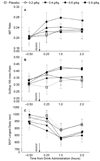A test of alcohol dose effects on multiple behavioral measures of impulsivity
- PMID: 18378098
- PMCID: PMC2566966
- DOI: 10.1016/j.drugalcdep.2008.02.002
A test of alcohol dose effects on multiple behavioral measures of impulsivity
Abstract
Background: Acute alcohol administration affects impulsive behavior, although these effects vary as a function of alcohol dose, assessment instrument, and time of measurement following administration.
Methods: We concurrently examined the dose-dependent effects of alcohol on three distinct types of impulsivity tasks (continuous performance [IMT], stop-signal [GoStop], and delay-discounting [SKIP] tasks). Ninety healthy alcohol drinkers were assigned to one of the three task groups (n=30 each), each group experienced placebo, 0.2, 0.4, 0.6, and 0.8 g/kg alcohol doses across 5 experimental days, and task performance was assessed at 0.5h before and 0.25, 1.0, and 2.0 h after alcohol administration. We hypothesized that impulsive responding on all tasks would be increased by acute alcohol administration both across time and during the peak BrAC, but the magnitude would depend on the task being tested. Analyses included the time course and the peak BrAC effects. Task comparisons of peak behavioral changes following each dose are illustrated using standardized scores.
Results: While alcohol consumption increased impulsive responding during all three tasks to some extent, our hypothesis was only partially supported. During the IMT, the 0.6 and 0.8 g/kg doses produced increased impulsive responding across time and at the peak BrAC. However, during the GoStop and SKIP, impulsivity increased across time regardless of the alcohol dose size, with no differences in impulsive responding among dose conditions at peak BrAC.
Conclusions: This study demonstrated alcohol-induced changes in impulsivity are not uniformly affected by alcohol. These data, in conjunction with previous studies, further support that impulsivity is not a unitary construct.
Figures




Similar articles
-
Acute effects of 3,4-methylenedioxymethamphetamine (MDMA) on behavioral measures of impulsivity: alone and in combination with alcohol.Neuropsychopharmacology. 2006 May;31(5):1048-55. doi: 10.1038/sj.npp.1300894. Neuropsychopharmacology. 2006. PMID: 16160704 Clinical Trial.
-
Alcohol increases impulsivity and abuse liability in heavy drinking women.Exp Clin Psychopharmacol. 2012 Dec;20(6):454-65. doi: 10.1037/a0029087. Epub 2012 Oct 15. Exp Clin Psychopharmacol. 2012. PMID: 23066857 Free PMC article.
-
Adults with a family history of alcohol related problems are more impulsive on measures of response initiation and response inhibition.Drug Alcohol Depend. 2011 Sep 1;117(2-3):198-203. doi: 10.1016/j.drugalcdep.2011.02.001. Epub 2011 Mar 3. Drug Alcohol Depend. 2011. PMID: 21376480 Free PMC article.
-
The effect of alcohol on athletic performance.Curr Sports Med Rep. 2006 Jun;5(4):192-6. doi: 10.1097/01.csmr.0000306506.55858.e5. Curr Sports Med Rep. 2006. PMID: 16822341 Review.
-
Subjective response to alcohol challenge: a quantitative review.Alcohol Clin Exp Res. 2011 Oct;35(10):1759-70. doi: 10.1111/j.1530-0277.2011.01521.x. Epub 2011 Jul 20. Alcohol Clin Exp Res. 2011. PMID: 21777258 Free PMC article. Review.
Cited by
-
The effects of oral d-amphetamine on impulsivity in smoked and intranasal cocaine users.Drug Alcohol Depend. 2016 Jun 1;163:141-52. doi: 10.1016/j.drugalcdep.2016.04.013. Epub 2016 Apr 19. Drug Alcohol Depend. 2016. PMID: 27114203 Free PMC article.
-
Deciding when to "cash in" when outcomes are continuously improving: an escalating interest task.Behav Processes. 2011 Oct;88(2):101-10. doi: 10.1016/j.beproc.2011.08.003. Epub 2011 Aug 25. Behav Processes. 2011. PMID: 21871951 Free PMC article.
-
Working Memory Performance Following Acute Alcohol: Replication and Extension of Dose by Age Interactions.J Stud Alcohol Drugs. 2019 Jan;80(1):86-95. doi: 10.15288/jsad.2019.80.86. J Stud Alcohol Drugs. 2019. PMID: 30807279 Free PMC article. Clinical Trial.
-
The effects of progesterone pretreatment on the response to oral d-amphetamine in Women.Horm Behav. 2010 Aug;58(3):533-43. doi: 10.1016/j.yhbeh.2010.04.003. Epub 2010 Apr 24. Horm Behav. 2010. PMID: 20399212 Free PMC article. Clinical Trial.
-
Alcohol facilitates detection of concealed identity information.Sci Rep. 2018 May 18;8(1):7825. doi: 10.1038/s41598-018-25811-z. Sci Rep. 2018. PMID: 29777122 Free PMC article.
References
-
- Acheson A, Reynolds B, Richards JB, de Wit H. Dazepam impairs behavioral inhibition but not delay discounting or risk taking in healthy adults. Exp. Clin. Psychopharmacol. 2006;14:190–198. - PubMed
-
- Allen TJ, Moeller FG, Rhoades HM, Cherek DR. Impulsivity and history of drug dependence. Drug. Alc. Dep. 1998;50:137–145. - PubMed
-
- Barratt ES, Patton JH. Impulsivity: Cognitive, behavioral and psychophysiological correlates. In: Zuckerman M, editor. Biological Bases of Sensation Seeking, Impulsivity, and Anxiety. Hillsdale, NJ: Lawrence Earlbaum Associates; 1983. pp. 77–121.
-
- Beck LH, Bransome ED, Jr, Mirsky A, Rosvold HE, Sarason I. A continuous performance test of brain damage. J Consult Psychol. 1956;20:343–350. - PubMed
-
- Benjamin L, Wulfert E. Dispositional correlates of addictive behaviors in college women: Binge eating and heavy drinking. Eat. Behav. 2005;6:197–209. - PubMed
Publication types
MeSH terms
Substances
Grants and funding
LinkOut - more resources
Full Text Sources
Medical

